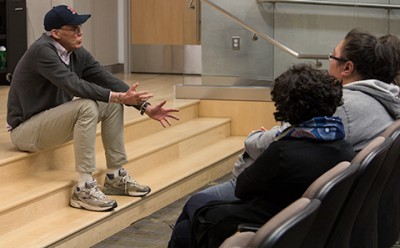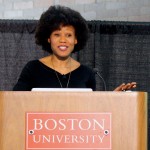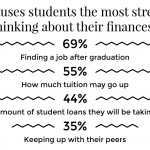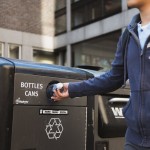
Boston University student group Divest BU hosted Bill McKibben, one of the leading activists for environmental justice, and two other speakers from his organization 350.org, Ferrial Adam of South Africa and Koreti Tiumalu of New Zealand, in a Tuesday forum.
According to the 350.org website, the organization’s goal is to “reduce the amount of CO2 [carbon dioxide] in the atmosphere from its current level of 400 parts per million to below 350 ppm.”
All three speakers brought their own personal experiences into their talks, speaking about why BU and other institutions should help the environment and population on a global scale.
Before the forum, Rachel Eckles, the vice president of Divest BU and a sophomore in the College of Arts and Sciences, said she hoped attendees would leave motivated to get involved and contribute to the divestment cause.
“It will be really valuable to hear from one of the people who started this movement to encourage institutions to divest,” she said.
McKibben opened the forum by suggesting that climate change is a global issue. He displayed a slideshow of people from different countries holding up signs displaying “350” in their homes, many of which had been destroyed by results of climate change.
Adam urged everyone in the room to get involved in any way they can. One member of the audience asked her how she would demonstrate to the BU Board of Trustees the social harm that fossil fuels cause, a requirement for the board to consider divestment. Adam said the Board should travel to Africa so they can see the destruction for themselves.
“We cannot do it on our own … but they cannot silence everyone on earth,” she said.
Tiumalu spoke about her involvement with 350.org in the Pacific Islands, where her parents were born. In one account, she recalled helping organize with different island communities who built canoes to blockade coal-mining ships. She said there were 22 ships scheduled for that day, but only four got through.
The panel comes a week after a school-wide referendum on the BU Student Government ballot showed that 75 percent of students who voted believe BU should divest from fossil fuels.
“We will hopefully present these results to the Advisory Committee on Socially Responsible Investing and just give them a chance to talk with us about how students are feeling about the topic and then from there it’s in their hands,” Eckles said. “They will be making a recommendation within the year to the Board of Trustees, and then the Board of Trustees will make the call.”
In terms of the divestment movement at BU, Itai Vardi, a professor in CAS, said he is hopeful the efforts being made will affect every facet of the university.
“Now we see that … there are other constituents among the university community members that want to see this happening,” he said. “The push from various groups within the university is strong and the message is clear that the university has to get out of these companies, which are the major actors, or players, that are driving the climate crisis.”
Several students who attended the forum said they found it to be interesting and informative.
“[Climate change is] probably the most important issue facing our society in the near future, and we need to do something about it,” said Lucas Stegman, a junior in CAS. “It was amazing to see different speakers from different kinds of backgrounds experiencing climate change in very different ways and then combatting it in different ways.”
Kevin Smith, a graduate student in the Frederick S. Pardee School of Global Studies, said climate change is what drove him to pursue his master’s degree and attend BU.
“It was interesting to [hear] first hand from Koreti [Tiumalu] because I lived in Wellington, New Zealand for a while, which kind of drove it home a little bit more,” he said. “I think we need to move away from fossil fuels as soon as possible, certainly. And the divest movement’s a good way to do it. But, there are people with more money than the university has.”
Cheta Siletti, a junior in CAS, said she thought the speakers’ backgrounds made the case for divestment even more inspirational.
“I think it was really cool to [hear from] people from such disadvantaged countries,” she said. “You wouldn’t think that their top priority would be to protest climate change, but then you see people rallying together where they don’t have clean water and they don’t have developed places to live like we do, and they’re coming together to combat an issue that is very global and is affecting everyone.”




